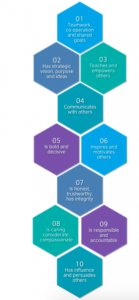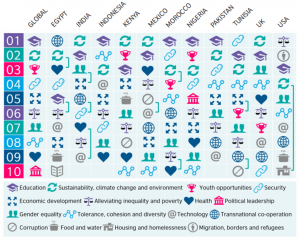This new report explores the visions and priorities for global change amongst aspiring millennial leaders (aged 18-35) around the world.
Working with the British Council, Common Vision examined the most important priorities for for global change amongst aspiring young leaders aged 18-35 from Egypt, India, Indonesia, Kenya, Mexico, Morocco, Nigeria, Pakistan, Tunisia, the United Kingdom and the United States. Built with the views from 11,000 applicants to the British Council’s Future Leaders Connect programme, a global network which aims to enable young leaders from the around the world to develop their expertise, connect and discuss major global policy challenges.
What the results show:
Young global leaders share similar visions for the future with one another, as well as prioritising policy areas that will affect future generations.
Responses spanned 29 themes, particularly striking is the similarity in global priorities of emerging leaders across all of the participating countries. ‘Education’ and ‘sustainability, climate change and the environment’ were both among the top five priorities across all countries. ‘Addressing poverty and inequality’, and ‘promoting gender equality’ were both top ten issues in ten of 11 countries. ‘Economic development’ and ‘tolerance and diversity’ were in the top ten themes for nine countries, whilst ‘conflict resolution and peace’, and ‘transnational co-operation’ featured in eight countries as a top ten priority.
Leadership
The report also looked at what good leadership means, providing a blue- print for the skills and characteristics that these young people hope to see from those who lead them now and in the future.

There was a striking degree of agreement between participants with priorities being notably similar. In all 11 countries, ‘working with a team’ – including mentions of teamwork, co-operation and shared goals – was the most frequently mentioned characteristic. Definitions of good leadership which specifically mentioned the need for a leader to have or to articulate a ‘vision and strategic purpose’ featured in the top three for every country. The need for leaders to teach, empower and support others to learn resonated across all countries. In contrast, definitions based on the knowledge and experience of a leader, and ‘hard skills’ such as management and professional skills, were given a lower priority.
Next steps:
- Find out how you can join our community of youth friendly employers working to tackle some of these problems here
- Explore our Young Professional Membership our tool for allowing young people to explore and manage their own skill development













